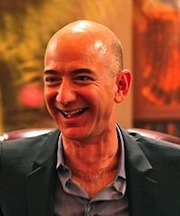
Success often feels like a chase, especially in the startup world. You scrabble to gain ground, obsessing over features and metrics and competitors, and though you think you’re moving fast and hard, sometimes it feels like you’re running up a down escalator.
For Amazon’s Jeff Bezos, success isn’t a pursuit or a race to the top. It’s an adventure. You don’t just buy The Washington Post when you think you’re in a race. Rather, his key to success is maintaining a mindset of exploration rather than conquest. Bezos told Charlie Rose in 2012:

Some companies have more of a conqueror mentality. If you look at their annual strategic plan, it starts with their three top enemies, who they’re going to crush this year…. We have an explorer mentality, so we like to go pioneering. We like to find dark alleyways and wander down them and see if they open up into broad avenues, and sometimes they do. That pioneering, explorer mentality is really what drives us. That’s the core of the culture.
For all the lip service paid to innovation and disruption, the conventional quest for business success can translate into fighting shy of risk and looking to just do better than your neighbor more often. The explorer mentality changes your lodestar. You’re not looking to catch up to others, but looking to forge new paths, and that frame of mind makes a huge difference.
Wandering in and out of unfamiliar areas can be perilous but two complementary aspects of Amazon’s company culture make the explorer mentality click — and that’s a long-range orientation and an obsession with customers.
It’s All About the Long Term
In describing what startups are really like, Paul Graham pinpoints the often overlooked fact that “everything takes longer than you expect.” Despite the speed and agility with which you’re moving and the apparent exhaust in your face from the zooming ascent you perceive of other startups, the road to success isn’t just a short jaunt but a long haul. But if you accept the reality of the long haul, there’s a bright side: “If you work patiently it’s less stressful, and you can do better work.”
Bezos has unfailingly adopted the long view and the patience it requires. In a 1997 letter to Amazon shareholders when the company went public, Bezos informed them that “a fundamental measure of our success will be the shareholder value we create over the long term.” This was right around the time that Amazon was still considered “an insignificant speck in the book-selling universe,” and Bezos recognized that to evolve out of speck status, he couldn’t be a follower of companies like Barnes & Noble and only focus on short-term wins.
“To do something a little bit crazy you have to be very optimistic, and I was,” he explained. It seems contradictory, but to embody this type of crazy long-term optimism, you also get over your over-confident self. In dismantling the illusion that you’ll hit success like a quick shot to the bullseye, you can focus on figuring out what actually works and create your own stamp rather than copying and chasing others.
In a timeframe of optimism that stretches far into the future, you gain more time and know-how to build game-changing winners. As Bezos recently told Harvard Business Review, persistence through the experimentation of exploration will carry you through:
[I]f if you’re long term oriented, customer interests and shareholder interests are aligned. In the short term, that’s not always correct. Also, we like to invent and do new things, and I know for sure that long term orientation is essential for invention because you’re going to have a lot of failures along the way.
Customer Obsession and the Explorer Mentality
What steers Bezos and Amazon through such pioneering in the long-term is an absolute focus on the customer. In opposition to its stark internal work conditions and highly demanding environment, Amazon draws in energy from the outside, driven by an “externally facing culture, looking at customers as our touchstone.”
Under the conquerer mentality, you’re guided by your competitors and limit yourself to their orbit. But when you start with the customer, you gain a balancing combination of freedom and focus. To the external observer, the sweeping philosophy of “what’s best for the customer?” that has led to moves like Kindle devices, competing with its own revenue streams, or taking on totally unrelated businesses can look nonsensical. Yet harnessing the explorer mentality to such an extent that you’re disrupting your own house is exactly what has brought such success to Amazon.
This extreme customer focus (and Bezos’s notoriously high standards) reverberates, self-selecting for and reinforcing the kind of innovative talent who also embrace the explorer mentality. Instead of being motivated by the competition of “which company are we going to kill?”, the people who flourish at Amazon are always “thinking about customers, and thinking about how to invent on behalf of customers, and they find that fun.”
When you align the driving vision of delighting customers and the latitude of pioneering all in the long-term horizon, you’re playing on a different field than most companies who aren’t willing to extend and expand their strategies to such a degree.
Bezos is nothing if not ambitious, and that professed explorer mentality can still prove quite relentless and overpowering. Even though you might not set out with a small-scale conqueror mentality, if you attain success on your explorer journey, you might just crush more competition and crush more formidably in the end.
Liked this post? Subscribe to our free newsletter for more great content on productivity, startups, and how to work better!
Images: [1] Amanda Tipton/Flickr; [2] Steve Jurvetson/Wikimedia
